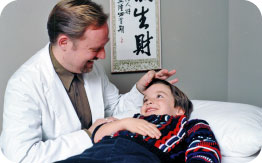- Oriental Medicine
- Nutritional Therapies
- Healthy Weight Loss
- Chiropractic
- Massage
- Mind/Body
- Rehabilitation
Oriental Medicine
"The most significant indicator of health is not what happens to us, but how we respond to what happens to us physically, mentally and emotionally."
Chinese Proverb
Oriental medicine is used to ease pain and treat ailments. Centuries of experience and wisdom have evolved into natural, pain-free treatment. There are two primary components of Oriental (Chinese) medicine: Acupuncture and Herbal medicine.

Acupuncture
This technique of treatment involves the insertion of very fine needles into the skin to stimulate specific areas of the body. Considered the original holistic medicine, it has been in use for more than 5,000 years and is performed in conjunction with Chinese herbal medicine and medical massage. Acupuncture provides an understanding of how different symptoms often come from a single problem. This form of medical practice emphasizes the treatment of the whole person; treating the source of the problem and not just the symptoms.
When I came to AWC, I had nowhere left to go for my chronic sinus condition. Now, I no longer have sinus infections. With acupuncture it takes a few minutes for any flare-ups to be controlled. He was able to turn the whole thing around." - Linda R.
Chinese Herbal Medicine
"As nature is, so is man" is the foundation of herbs as medicine. Mankind has used berries, flowers, twigs, leafs, roots, etc., to ward off illness for centuries. The Chinese have developed a rich and effective pharmacy to balance and detoxify the body's inner workings for improved mental and physical health. A custom prescription is formulated according to each patient's needs.
Acupuncture is a life-changing event. It is a pleasant, relaxing experience, which stimulates the body and it's nerve endings. My daughter has had monthly treatments from age 12 to 18 and she loves it, too." - Norena T.
Frequently Asked Questions
Many of our patients are new to the practices and teachings of Oriental medicine. We have compiled a list of the most frequently asked questions to help you better understand why acupuncture and herbal medicine have been practiced for centuries throughout the world.
What does acupuncture do?
Healing is our body's natural response that spontaneously occurs when we are not functioning well (out of balance), and as a result, become sick or injured. There are times when this healing response becomes blocked or is so weak it becomes ineffective. Acupuncture is a medical technique used to correct these imbalances - without drugs or surgery - so that our bodies heal naturally. Read more...
How does it work?
Oriental medicine is based on the understanding that life is created and maintained by an unseen force known as Qi (pronounced "Chee"). Qi flows throughout our body and connects our major organs with each other and with the surface of the body. This has the effect of delivering ‘life' to every part of our being. The unobstructed flow of Qi is responsible for normal functioning of the body and mind and promotes growth, development, and longevity. During the past 5,000 years, acupuncturists have discovered points just beneath the surface of the body where our Qi can be manipulated - calmed down or stimulated. Qi manipulation has a powerful effect on healing our mind and body.
What is the definition of health?
Health, according to ancient Chinese philosophy, is defined as our ability to adapt to change. Illness is defined as adapting poorly to change. Change occurs with age, location, money availability, mobility, perceptions, seasons, social status, work environment, etc. If we roll with the "punches" of life and maintain a sense of well being, then we are adapting well. This doesn't mean that we are without challenges, stressors or illness, but how we handle and adapt to them defines our health. When we get frustrated, angry, feel guilty, depressed, anxious or worried, we are challenged. How we cope with these human experiences is what is meant by, "adapting well or poorly." Becoming "stuck" is one significant cause of and contributor to the disease process.
Oriental medicine helps us through our "stuck" places - even serious places. As long as we are flowing, moving and changing, we are adapting well, enjoying life and learning from our seemingly negative experiences including illness, disease and infirmity.
How is illness defined?
All diseases arise from our body's self-regulatory responses becoming stuck or too weak to resolve the problem by itself. Illness in Western terms separates the person from the illness and is described as biology gone awry, or pathology. In this scenario, different people with similar symptoms can all have the exact same pathology and therefore the same disease. In Chinese medicine, the person cannot be separated from the illness. Therefore, different people with similar symptoms have different illnesses that are unique to them. This is called the holistic view of disease. Both approaches provide useful information that will direct treatment. In the West, this new dimension of holism is slowly being added to medical awareness.
How is acupuncture performed?
Acupuncture is performed by the skillful insertion of specialized needles, which are as fine as a human hair, into specific points of the body known as acupuncture points. Because the center of each point is found beneath the surface of the skin, it requires a needle to stimulate it. Stimulation of an acupuncture point positively influences many areas of the mind and body, not just the specific area of complaint.
Is it painful?
The sensation felt during the insertion of an acupuncture needle varies, depending on the person's state of health. Most patients report little or no pain and even a pleasant sensation is frequently noted. Blood vessels and nerves are avoided during the procedure and nothing is injected into or drawn out of these points.
How safe is it?
Acupuncture needles are made from surgical grade stainless steel. They are pre-sterilized and intended for single-use only. The FDA officially recognizes them as "medical devices." The National Institute of Health (NIH) and the World Health Organization (WHO) both acknowledge known conditions for which acupuncture is recommended.
What kind of training is required to practice acupuncture?
A four-year Masters degree with clinical training is required to become licensed. California has the highest national standards for licensing (which includes full training in Chinese medical herbology). Acupuncturists like medical and chiropractic doctors, are licensed as primary care providers and trained to diagnose and formulate treatment plans, which are unique skills of primary health care providers (as opposed to medical technicians, nurses and physician assistants who do not diagnose). In California, once an acupuncturist is licensed he/she is qualified to be a primary care provider. Oriental medicine diagnoses illness and disease differently from the Western perspective and therefore requires separate training. Physicians with a medical degree (MD) can perform acupuncture without the benefit of a formal Oriental Medicine education (See www.acupuncture.com for more on licensing requirements in America).
Can acupuncture help me?
Clinics that promote natural and holistic methods of treating disease and improving health use Oriental medicine to treat the broadest range of conditions. Properly trained and experienced acupuncturists treat orthopedic, pediatric, gynecological, fertility, geriatric and mental/emotional conditions, as well as other areas of medicine. As a medical technique, the practice of acupuncture in America is fast becoming incorporated into many areas of our traditional medicine.
Does my insurance cover acupuncture?
The Advanced Wellness Center is dedicated to assisting all patients. Many types of medical insurance do cover acupuncture, including many PPO plans, workers' compensation and personal injury (i.e., auto accidents). A call to our office can confirm if a particular insurance carrier covers certain types of treatment.
How long does a treatment take?
An acupuncture treatment generally takes about an hour to complete. The first visit will take longer, two hours or more, as it includes a review of the patient's medical history and a subsequent consultation. Diagnosis of the patient's complaint(s) and the impression of his/her overall state of health are made at this time, along with a comprehensive treatment plan to correct the situation.
Doctors and
Practitioners
Call to schedule a
free telephone or
office consultation.
562.795.6680
